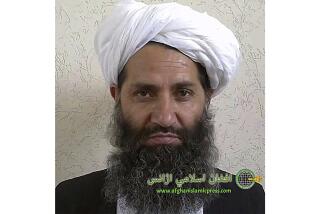Karzai demands end to raids on houses
- Share via
Reporting from Kabul, Afghanistan — President Hamid Karzai demanded Wednesday that the U.S.-led NATO force refrain from nighttime raids on Afghan residential compounds, actions that are described by the Western military as a key tactic in the fight against the Taliban and other insurgent groups.
The president’s call came at the opening of a three-day loya jirga, or grand council, attended by about 2,000 tribal elders, community leaders and dignitaries. The Afghan capital was under virtual lockdown for the start of the gathering, after a flurry of Taliban threats against participants.
Security concerns were such that Karzai traveled by helicopter from his presidential palace to the site of the jirga, a distance of only a few miles.
The Afghan leader has previously spoken out against night raids, but his unyielding language at a forum as high-profile as the jirga pointed to continuing difficulties in working out a long-term security pact with the United States. Negotiators have been trying for months to conclude the so-called strategic partnership accord, addressing U.S.-Afghan relations after most Western combat troops depart in 2014, and night raids have been a major sticking point.
“We want an end to house searches by the U.S. and NATO; it is not acceptable to us,” Karzai told his audience of tribal leaders in turbans and robes, intermingled with representatives of civic groups in Western business dress. “We don’t accept night raids on our houses, absolutely not.”
U.S. military officials credit night raids with doing significant damage to the field leadership tier of the Taliban and other militant groups, such as the Haqqani network, resulting in the capture or deaths of hundreds of insurgent commanders. But the strikes are widely loathed by Afghans, who consider intrusions into homes a major cultural affront.
Human rights groups have also argued that night raids pose a danger to civilians because it is easy for civilians to be mistaken for combatants in darkness and confusion. Also, most rural Afghans keep weapons in their homes and are likely to try to fire on any intruders.
Western officials have long maintained that a large percentage of the raids are carried out without firing a shot. But an independent study this year by the Open Society Foundations suggested that night strikes are militarily counterproductive, in part because mistaken killings and arrests inflame the Afghan people against the Western military presence.
In his speech, Karzai also indicated that the long-term presence of U.S. bases in Afghanistan would be contingent on abolishing Western military-civilian provincial reconstruction teams, which he has long denounced as “parallel structures” that usurp the authority of the Afghan central government.
The president also called for the shutdown of foreign detention centers for Afghan prisoners. The North Atlantic Treaty Organization’s transition to Afghan control over jailed insurgent suspects was recently jolted by U.N.-documented reports of detainee abuse, and some prisoner transfers were suspended as a result.
The jirga convened by Karzai — against the wishes of some of his political rivals — has no formal decision-making powers, and was read mainly as an opportunity for him to spell out his views for a domestic audience and garner prestige and support before any clash with the parliament over a long-term pact with the United States.
As the jirga was getting underway, NATO’s International Security Assistance Force, or ISAF, reported the deaths of three service members in southern Afghanistan and a fourth in eastern Afghanistan. Their nationalities were not disclosed, in keeping with ISAF policy. The majority of troops in the south are American or British and most in the east are Americans.
More to Read
Sign up for Essential California
The most important California stories and recommendations in your inbox every morning.
You may occasionally receive promotional content from the Los Angeles Times.









